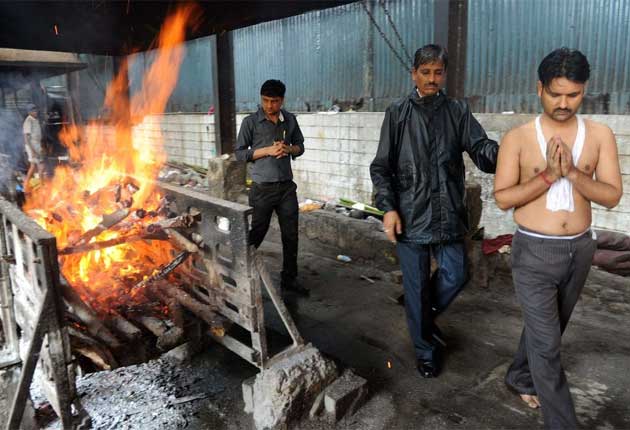Rain hampers Indian effort to find bombers
On a day when the monsoon rain barely paused relatives of the injured and the dead gathered at hospitals

Police in Mumbai investigating the trio of bomb blasts that tore through the city on Wednesday were last night pinning their best hopes on CCTV footage recovered from the site of the explosion as they revealed heavy rains may have destroyed much forensic evidence.
As the Indian government sought to counter mounting public anger over the latest strike to hit the country's financial capital by insisting there had been no intelligence failure, anti-terrorism officers admitted they were no closer to identifying who was behind the attacks.
"All angles are very viewed," said Rukesh Maria, head of Maharashtra state's anti-terrorist squad. "All possibilities are being examined... The investigation is a long, drawn-out process."
As police said they continued to probe all options – with the Indian Mujuhideen, a home-grown terror network, said to be among those groups being looked at – officers said the devices that exploded were made of ammonium nitrate. One report said a body had been found with wires attached; police could not say whether a suicide bomber had been involved.
The authorities said the death toll stood at 18 and that more than 130 people had been injured, many of them seriously. On a day when the monsoon rain barely paused, relatives of the injured and dead gathered at hospitals across the city, anxiously seeking any news on survivors or waiting to take away a body for cremation or burial.
"A total of 26 people were brought here. Four of them were dead, 10 were grievously wounded," said Dr Satish Synone, a senior physician at Gokuldas Tejpal hospital.
"They were suffering from burns, abrasions, foreign bodies. We had to perform surgery."
India's Home Minister, Palaniappan Chidambaram, claimed the attacks had been an assault upon the country's "unity, integrity and prosperity".
He admitted the intelligence agencies had no prior information about the blasts and yet he insisted this did not equate with an intelligence failure. Somewhat confusingly he said: "There are elements that are hostile to India and they are behind the bomb blasts that have occurred over the past 10 years."
Such comments did not go down well in the three areas where the bombs exploded between 6.50pm-7.05pm on Wednesday. In the neighbourhood known as Opera House, where thousands of diamond dealers form what is said to be the largest gem bourse in Asia, Rajiv Popley had opened his family-owned jewellery store, more as an act of intent rather than in the realistic expectation of a customer.
Mr Popley said the diamond and gem industry was one of the biggest foreign currency earners for India, yet he said the authorities had failed to protect them. A number of diamond dealers are believed to have been among the dead and injured; one report suggested, a little fancifully, that dealers carrying their stones to the nearby vaults may have been struck by flying gems as well as shards of glass.
"There is a lot of anger," he said. "There are lapses of intelligence that are happening all the time in this city."
It is a cliché to talk about the spirit of the people of a city that has endured numerous attacks over the years. In truth, the people of Mumbai get tired of having to get over such incidents.
"We have that fear. We don't know what will happen any day," said Dr S M Choubey, a lecturer. "Everyone in Mumbai has to face all these things."
Join our commenting forum
Join thought-provoking conversations, follow other Independent readers and see their replies
Comments
Bookmark popover
Removed from bookmarks